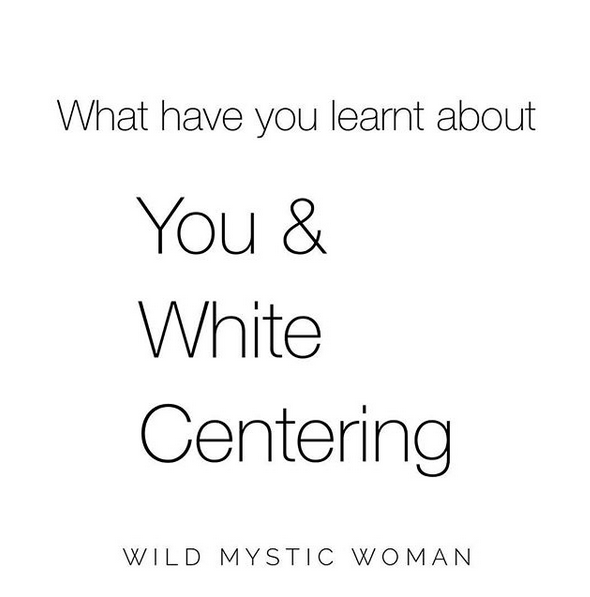
Me & White Centering
I’ve seen my white perspective as the most normal, comfortable and desirable. This is exactly how the patriarchy and white supremacy want white people to walk through the world, so many of our systems support this belief. I felt justified in upholding white-centered values without deeply considering how suffocating/harmful this must be for BIPOC.
Despite all I’ve learned from books, TV shows/movies and classes about our violent, bloody history of colonization, I’ve had a major disconnect in my real time communications with BIPOC. I constantly respond in ways that bring the focus back to me, my feelings and my experience rather than listening deeply to another perspective, being curious or giving focus and/or attention to BIPOC.
My white-centric world view is a result of laziness, apathy, accepting the status quo and pure ignorance that has gone unchallenged a shocking amount of my life. I haven’t spent much time outside my white comfort zone. I don’t pay close attention to world news or go out of my way to stay informed by sources other than mainstream liberal media. I’ve been focused on myself for so long and spent years of my life studying psychology to try to understand myself and learn about healing from pain/trauma without acknowledging or attending to the pain/trauma of BIPOC that is caused by white supremacy and racism.
I’ve taken it personally and been shocked when my whiteness has not been allowed to be centered. I didn’t have a clue that it was because of the long tradition of racist, toxic, violent white behavior that I participated in. I didn’t consider that BIPOC needed to create spaces for themselves to be able to relax, breathe and have some relief from oppression, expectations of catering to whiteness and so much more. I can barely believe how hypocritical and infuriating this behavior is now that I see it happening everywhere.
I’ve caught myself thinking of my comeback response, my “but I’m a good person…” shpiel, or reasons/proof of why I’m not racist instead of listening to BIPOC. I see the backlash and racial aggression that occurs when a white person is asked to not comment, not to attend or not speak in very specific situations. I’ve felt these hard feelings myself, even though as a white woman, I have unlimited opportunity to speak, attend & participate 99.9% of the time. Plus white privilege. Still I (and so many other white people) melt down and often become unhinged, angry, defensive and infantile if a BIPOC sets a boundary based on our whiteness despite the extensive and ongoing history of discrimination white supremacy has upheld.
This is in response to Layla Saad‘s 28 Day #MeAndWhiteSupremacy Instagram Challenge. @wildmysticwoman
DAY 16: “Before moving with today’s prompt, make sure to watch the video from Day 15 on my YouTube channel. Also do not comment here unless you have completed Days 1-15.
Under white supremacy, whiteness is centred. Meaning, whiteness is seen as the norm. Whiteness is seen as the highest value measure of ‘rightness’, ‘goodness’, ‘truth’, ‘excellence’ and ‘worthiness’. White-centered values and modes of being/creating/speaking/existing/protesting/etc are what are seen as the most right and the most desired. Conversely, when whiteness is not centred (e.g. when BIPOC-only spaces are created, when White Tears are ignored in racial conversations, when hashtags like #blackgirlmagic are used, when cultural appropriation by white people is called out, when BIPOC are in leadership positions, etc.), there is often a white backlash. Whiteness is so used to taking up space in all spaces, that when it is restricted or a boundary is put in place to centre or protect BIPOC, its reaction is often one of White Fragility, Tone-Policing, Superiority, Exceptionalism or just straight up violence (whether verbal or physical).
What have you learnt about You & White Centering? How is your world view a white-centered one? How have you reacted when whiteness or you as a white person are not centered? What are you beginning to understand about how white centering affects and others BIPOC?” – Layla Saad
1 Comments
Leave a Comment
You must be logged in to post a comment.
Thank you for posting this! Currently on Day 16 and it’s helpful for me read what others have shared ?